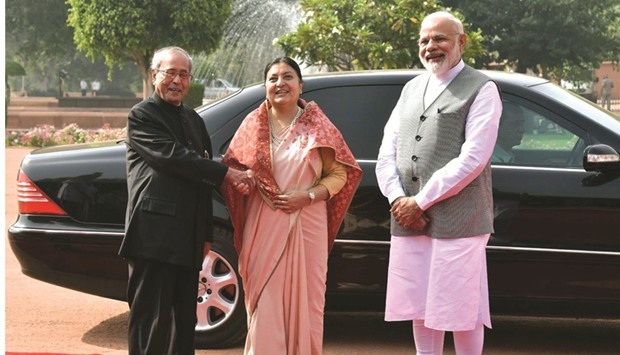Inviting Indians investors to her country, Nepal President Bidhya Devi Bhandari yesterday said that after political transformation, socio-economic transformation is Nepal’s top priority and it is keen to benefit from India’s tremendous progress.
“Nepal has undergone political transformation of historic proportion in recent years. Now socio-economic transformation is our topmost priority. If not backed by economic transformation, political transformation cannot be sustainable,” Bhandari said at an event organised by industry chambers CII, Ficci and Assocham.
She said achievements made by India in economic, social, scientific and other fields are remarkable and Nepal is keen to benefit from India’s success.
“For Nepal, India remains the largest trading partner... We are closely engaged in Saarc, BIMSTEC and BBIN and these regional and sub-regional platforms could be made more effective in delivering results,” she said.
Emphasising that Nepal treats the private sector as a partner for development, Bhandari pointed out that Nepal has opened up almost every sector for foreign investment, including manufacturing, hydropower, tourism, services, mining and agro-based industries.
“The government is committed to creating a climate conducive to investment. No discrimination is made between Nepali and Indian investors. Numerous similarities make us natural partners.
“BIPPA (Bilateral Investment Promotion and Protection Agreement) with India is under consideration for ratification while the double taxation avoidance agreement has already been signed,” she said.
She said that incentives for investment in Nepal are no less attractive than those in many other countries.
“Ours is a virgin land for investment and any area is profitable. Importantly, location of Nepal in the middle of two thriving economies of the world offers greater advantages to potential investors,” she said, adding that the abundance of water resources in her country has tremendous potential of utilisation.
“We can put our efforts together to harness these resources for mutual benefit. Capitalising on this potential we can lead in the sector of cleaner technology and greener growth,” Bhandari observed.
Inviting the Indian businesses to invest in her country, Bhandari said a prosperous Nepal will also be “in the interest of our neighbourhood and beyond”.
In his address earlier, Nepal Foreign Minister Prakash Sharan Mahat tried to allay apprehensions about political stability in Nepal, saying there was a complete consensus over economic issues across political spectrum and that Nepal’s economy may achieve a growth rate of 8-10% in next few years.
“You may wonder Nepal has different parties - Communist Party, Maoist Centre etc. If you have some image, erase that. Left parties or right parties, we have a consensus. I am from Nepali Congress and my prime minister is from Maoist party, but we are together and there is a total consensus,” he said.
Indian Minister of State for External Affairs V K Singh said that India’s relations with Nepal are just not historical, they are deep and multi-layered and “cannot be defined in words”.
He said bilateral economic cooperation is beneficial for both countries.
Earlier in the day, the Nepal president was accorded a ceremonial welcome at the forecourt of Rashtrapati Bhavan. Later, she paid tribute to Mahatma Gandhi at Rajghat.
Following this, External Affairs Minister Sushma Swaraj called on her.
Later in the day, Prime Minister Narendra Modi called on Bhandari at Rashtrapati Bhavan where she is staying.
“We are honoured to welcome President Bidya Devi Bhandari of Nepal. Had fruitful talks with her,” Modi tweeted.
This is Bhandari’s maiden foreign tour after assuming office in October 2015.
She is accompanied by a 33-member delegation that includes Foreign Minister Mahat and Peace and Reconstruction Minister Sita Devi Yadav, five women MPs and senior officials.
She will also visit Gujarat and Odisha before returning to
Kathmandu on Friday.

Nepal President Bidhya Devi Bhandari being received by India’s President Pranab Mukherjee and Prime Minister Narendra Modi at the ceremonial reception at Rashtrapati Bhavan in New Delhi yesterday.
